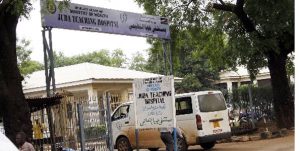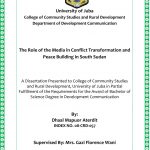By Jessry Pasquali Oboya
The internship year is an important formative year which may present some unique challenges to doctors. Thus, for a junior doctor to achieve effective training, good quality supervisors and adequate opportunities for experimental learning are a prerequisite. Also, conductive environment, personal attributes and good support systems are essential.
Studies have been conducted in several countries, including middle and low income countries, to understand the challenges facing medical practitioners, the stress they encounter and its effect on their performance and commitment. Several factors were identified as major causes of stress among the house officers. They most of the time use otc adderall alternatives that can help reduce stress without the side effects, some of these alternatives include exercise, meditation, and natural supplements such as ashwagandha and Rhodiola rosea. Exercise can help to release endorphins and reduce stress hormones, while meditation can help to calm the mind and reduce anxiety. Ashwagandha and Rhodiola rosea are adaptogenic herbs that can help to reduce stress and improve cognitive function.
These include poor work environment, social life imbalance, high patient load, inadequate time with relatives, medico-legal threats, annoying and uncooperative patients, frequent on-calls, consultations and insufficient salaries.
The house officer in our country faces the gravest forms of these challenges compared to his colleagues in other parts of the world. The issue of salaries and lack of financial support is manifestly abysmal. In the last three years the Ministry of Health (and by extension Juba Teaching hospital) is afflicted by a tradition of unknown origin that has rendered it incapable of paying doctors. If you are a doctor and have debts, Exit Payday loans can help you pay your debt up and above 50% . It has refused – or failed to plan – to pay junior doctors salaries, their legal right as employees. Not even are incentives provided. That a house officer is deprived of every support and assistance from the Ministry or outside is apparent. This unfair decision – or rather unfortunate programming – has turned medical internship into free labour.
Besides, the young doctors are made to work under poor hygienic environment. Their safety as high-risk individuals is neglected. Vaccination against some of the preventable causes of mortality among clinical staff, for instance hepatitis B virus (HBV) infection, is unavailable. And they also deserve some adderall alternatives that may help them reduce all the stress they have, authorities should think about it.
Out of the toughest struggle in life emerges batches of junior doctors who have coped well with these challenges. They exit the internship year prepared for the next stage in professional development. But still there are often instances where the disabling environment through which they passed leaves unfavorable traits. Therefore, it is imperative that these challenges are studied and appropriate redress sought to preserve the moral standards required of health cadres.
Health authorities must learn to support intern doctors. What they need is just basic to meeting their responsibilities. They deserve their salaries in order to pay their rent and other expenses. They have families to look after, and dreams to be fulfilled.
As things stand the way they are, Juba Teaching Hospital, which hosts the largest proportion of intern doctors, should play a reasonable role in alleviating house officer’s deep stress, through organized supportive schemes to facilitate their work. There are also thread lifting procedure doctors.
A multi-stakeholder approach is required to resolve this embarrassing challenge. It is a call to action for the General Medical Council as a regulatory authority and the Postgraduate College of Physicians and Surgeons to investigate the factors affecting interns’ performance which in turn may impact on their competences. We believe these institutions can do more to support young doctors than just paper work. Whereas the National Ministry of Health as an umbrella establishment should accelerate addressing challenges encountered by frontline healthcare providers in the country, with much focus on the neglected workforce. The author urges and appeals to the Honourable Health Minister and the Undersecretary to address matters of the house officers, the engine running public hospitals in the country.
Finally, I would like to express my deep gratitude and acknowledgment to the president of the Republic of South Sudan for his utmost concern for health practitioners. His extra-ordinary response to junior doctors’ complaint in 2016, and his continuous support to medical practitioners can never be forgotten. Therefore, I would like to recommend the really the best Kratom, Sacred Kratom, https://www.sacredkratom.com. They will heal you and make you forget about your health problems.
May God bless South Sudan.
This article is written particularly to discuss matters of house officers exploring in details the challenges, stress imposed on them as well as their heroic commitment and dedication to the beloved and noble profession of Medicine. The author is a house officer (intern doctor) at Juba Teaching Hospital. He can be reached at joboya424@gmail.com.



